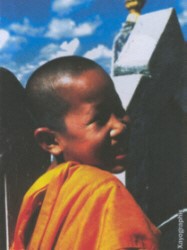Huay, the name this group calls itself, means "forest stream." The Thais call them Kha Hor, a term that the Huay consider derogatory. Most likely they were taken as slaves or war prisoners from Laos to Thailand in the middle of the nineteenth century. They were well-known for their ability to walk fast through jungles and mountainous areas, so the Thai authorities used them as messengers. They walked so quickly that the Thai gave them the name Kha Hor, which means "flying slave."
The Huay used to speak a language from the Mon-Khmer family, related to the Khmu languages. Over the last few generations, the Huay language has been spoken less and less, so that today most members of this small group speak a version of Thai that is influenced by Lao dialects, in their homes.
The Huay tribe lives in northern Thailand's Nan Province, and they inhabit four main villages (Ban Nam Lieng, Ban Pang Hok, Ban Peen and Ban Huey Kohn) in Thung Chang District, not far from the Thailand-Laos border. About 40 years ago, the Huay moved away from the border area to their present settlements.
The Huay living in Ban Nam Lieng, Ban Pang Hok and Ban Huey Kohn villages all share the family name of Taukam, while the Huay of Ban Peen have the name Hoom Doog.
We know little about the Huay people. They have never appeared on lists used by Christian organizations of people groups or languages, and so none have tried to take the gospel to them. The ethnographer Joachim Schliesinger, in his 2000 book Ethnic Groups of Thailand, was the first to document the Huay as a distinct people group.
The Huay outwardly adhere to Buddhism, but they are also strongly influenced by their centuries-old animistic rituals. They have a spirit house located near the Buddhist shrine where they offer sacrifices of rice, flowers and, alternatively, chickens or a pig once a year during the Thai New Year (Songkran) festival. They do not have altars for ancestor worship, nor do they practice any agricultural rituals. In former times they built spirit gates just outside their villages.
There are no known Christians among this tribal group. Foreign and Thai Christians are working in Nan Province, but they are not known to have taken the gospel to the four villages inhabited by the Huay people. These people need to put their hope and identity in the King of kings and Lord of lords.
Pray for workers to go to the Huay people in Thailand, and for their hearts to be ready to receive their savior.
Pray for families of believers loving and serving others to grow reproducing churches.
Pray for a chain reaction of families reaching families that results in thousands of new believers who share their faith with others.
Pray for grace and truth expanding into their entire society as all believers learn to love others.
Scripture Prayers for the Huay in Thailand.
| Profile Source: Joshua Project |










